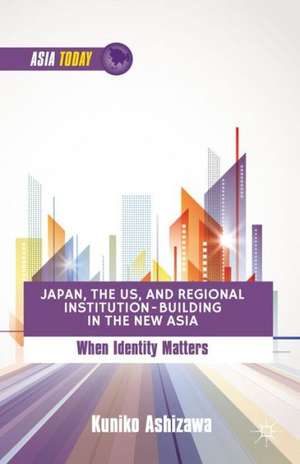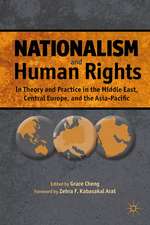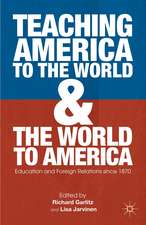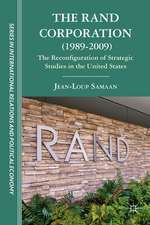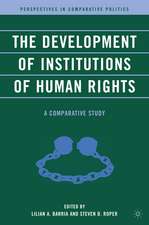Japan, the US, and Regional Institution-Building in the New Asia: When Identity Matters: Asia Today
Autor K. Ashizawaen Limba Engleză Hardback – 23 aug 2013
| Toate formatele și edițiile | Preț | Express |
|---|---|---|
| Paperback (1) | 384.70 lei 6-8 săpt. | |
| Palgrave Macmillan US – 23 aug 2013 | 384.70 lei 6-8 săpt. | |
| Hardback (1) | 388.72 lei 6-8 săpt. | |
| Palgrave Macmillan US – 23 aug 2013 | 388.72 lei 6-8 săpt. |
Preț: 388.72 lei
Nou
Puncte Express: 583
Preț estimativ în valută:
74.38€ • 77.86$ • 61.91£
74.38€ • 77.86$ • 61.91£
Carte tipărită la comandă
Livrare economică 01-15 aprilie
Preluare comenzi: 021 569.72.76
Specificații
ISBN-13: 9781137307736
ISBN-10: 1137307730
Pagini: 271
Ilustrații: XV, 271 p.
Dimensiuni: 140 x 216 x 20 mm
Greutate: 0.43 kg
Ediția:2013
Editura: Palgrave Macmillan US
Colecția Palgrave Macmillan
Seria Asia Today
Locul publicării:New York, United States
ISBN-10: 1137307730
Pagini: 271
Ilustrații: XV, 271 p.
Dimensiuni: 140 x 216 x 20 mm
Greutate: 0.43 kg
Ediția:2013
Editura: Palgrave Macmillan US
Colecția Palgrave Macmillan
Seria Asia Today
Locul publicării:New York, United States
Cuprins
PART I: INTRODUCTION 1. The Argument 2. Where Does This Stand? PART II: THE VALUE-ACTION FRAMEWORK AND STATE IDENTITY 3. The Value-Action Model of Foreign Policy Analysis 4. The Structural Dimension 5. The Dispositional Dimension 6. The Intentional Dimension 7. State Identity and Foreign Policy 8. State Identity: Definition 9. Identity-Value Nexus 10. Why Identity? When Does It Matter? PART III: JAPAN AND THE CREATION OF APEC: MITI'S QUIET MANEUVER, 1988-1989 11. Explaining Japan's Policymaking toward the Creation of APEC 12. Historical Narrative: Part I 13. The Value-Action Analysis: The Structural Dimension 14. Historical Narrative: Part II 15. The Value-Action Analysis: The Dispositional Dimension 16. State Identity: The Source of The Determinant Values 17. Decision-Making Context: Conceptualizaing a New Regional Order 18. A Dual Member of Asia and the West 19. Identity-Value Nexus 20. Remaining Questions and Competing Explanations PART IV: THE UNITED STATES AND THE CREATION OF APEC: GLOBAL HEGEMON AND REGIONAL COOPERATION, 1988-1989 21. Explaining U.S. Policymaking toward the Creation of APEC 22. Historical Narrative Part I: The United States and MITI's Proposal 23. The Value-Action Analysis: The Structural Dimension 24. Historical Narrative Part II: The Hawke Speech and Comprehensive Policy Review 25. The Value-Action Analysis: Activation of Decision-Making 26. Historical Narrative Part III: 'An Idea Whose Time Has Come' 27. The Value-Action Analysis: The Dispositional Dimension 28. Two Concepts of U.S. State Identity: The Sources of The Determinant Values 29. A Pacific Power 30. An International Institution-Builder 31. On Competing Explanations PART V: JAPAN AND THE CREATION OF THE ARF: MOFA IN MOTION, 1991-1994 32. Explaining Japan's Policymaking toward the Creation of the ARF 33. Historical Narrative Part I: The Nakayama Proposal 34. The Value-Action Analysis: The Structural Dimension 35. Historical Narrative Part II: MOFA's Persistent Commitment 36. The Value-Action Analysis: The Dispositional Dimension 37. Two Concepts of Japanese State Identity: The Sources of the Determinant Value 38. A Past Aggressor in Asia 39. A Dual Member of Asia and the West 40. Remaining Questions and an Alternative Explanation PART VI: THE UNITED STATES AND THE CREATION OF THE ARF: HEGEMONIC APPROACH TOWARD THE POST-COLD WAR ASIAN SECURITY ORDER, 1990-1994 41. Explaining U.S. Policymaking toward the Creation of the ARF 42. Historical Narrative Part I: Appraising Past Success 43. The Value-Action Analysis: The Structural Dimension 44. Historical Narrative Part II and Decision-Making Activation: Lord's 'Ten Major Goals' 45. Historical Narrative Part III: Toward the First ARF Meeting 46. The Dispositional Dimension: Stay Engaged with Asia 47. The Pacific Power Identity: The Source of the Engagement Value 48. An Alternative Explanation, A Remaining Question PART VII: CONCLUSION 49. State Identity and Foreign Policy 50. Japan, the United States, and Institution-Building in 21st Century Asia
Recenzii
In 2015, the Ohira Memorial Foundation in Tokyo, Japan awarded Japan, the US, and Regional Institution-Building in the New Asia the Masayoshi Ohira Memorial Prize, a well-known and prestigious prize for works which contribute to the development of 'the Pacific Basin Community Concept' as well as regional studies of the Pacific Basin region. The Ohira Memorial Foundation awards 4-5 books annually, half of which are expected to have been published internationally.
"The theoretical framework is clear, innovative, and strongly linked to existing literature; the empirical casework fills an important gap in our understanding of important developments in Asia-Pacific regionalism; and the prose itself is a pleasure to read Ashizawa helps us to conceptualize when identity matters in policymaking, and also helps to clarify how multiple identities can overlap to shape policy I, for one, would like to try to implement her framework in my own future work." - Andrew Oros, Director of International Studies and Associate Professor of Political Science and International Studies, Washington College, Maryland, USA
"For over forty years, specialists have debated whether various approaches explain international relations, only to find that none are completely adequate by themselves. Ashizawa's book smartly uses a more eclectic approach combining the constructivism of the concept of 'state identity' with the neo-realism of the notion of 'the structural attributes of states.'In so doing she ingeniously solves an intriguing puzzle in the international relations of the Asia Pacific: why Japan's and the U.S.'s behavior patterns were different but internally consistent across the founding of the first two significant transnational institutions in the region, APEC and ARF. A truly creative and novel contribution to both the growing literature on Asia-Pacific regionalism and to international relations theory." - Ellis S. Krauss, School of International Relations and Pacific Studies, University of California, San Diego
"Important new insights into the changing processes of US and Japanese policymaking in the Pacific multilateral arena, based on detailed empirical research." - Kent E. Calder, Director, Reischauer Center for East Asian Studies, SAIS/Johns Hopkins University
"The theoretical framework is clear, innovative, and strongly linked to existing literature; the empirical casework fills an important gap in our understanding of important developments in Asia-Pacific regionalism; and the prose itself is a pleasure to read Ashizawa helps us to conceptualize when identity matters in policymaking, and also helps to clarify how multiple identities can overlap to shape policy I, for one, would like to try to implement her framework in my own future work." - Andrew Oros, Director of International Studies and Associate Professor of Political Science and International Studies, Washington College, Maryland, USA
"For over forty years, specialists have debated whether various approaches explain international relations, only to find that none are completely adequate by themselves. Ashizawa's book smartly uses a more eclectic approach combining the constructivism of the concept of 'state identity' with the neo-realism of the notion of 'the structural attributes of states.'In so doing she ingeniously solves an intriguing puzzle in the international relations of the Asia Pacific: why Japan's and the U.S.'s behavior patterns were different but internally consistent across the founding of the first two significant transnational institutions in the region, APEC and ARF. A truly creative and novel contribution to both the growing literature on Asia-Pacific regionalism and to international relations theory." - Ellis S. Krauss, School of International Relations and Pacific Studies, University of California, San Diego
"Important new insights into the changing processes of US and Japanese policymaking in the Pacific multilateral arena, based on detailed empirical research." - Kent E. Calder, Director, Reischauer Center for East Asian Studies, SAIS/Johns Hopkins University
Notă biografică
Kuniko Ashizawa is a Senior Lecturer in International Relations in the Department of Politics and International Relations of Oxford Brookes University, Oxford, UK.
